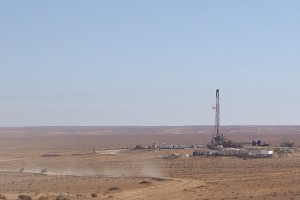Libya's oil industry is recovering from this year's war at a much faster rate than many people had hoped.
The revenue earned from the energy sector will ultimately pay for the reconstruction of this war-damaged nation.
Before the conflict, it was producing 1.6 million barrels of oil a day.
The fighting pretty much shut down the industry, as desert oil fields were deemed unsafe and oil rigs had to be abandoned because of the internationally-imposed no fly zone.
But in the few months since the end of hostilities, oil output has been increasing rapidly.
According to the National Oil Company, Libya is now pumping just over half of its pre-war level - 840,000 barrels a day.
The NOC has said it expects to be back at its pre-conflict output by the end of 2012.
Some in the industry are even more confident than that.
"I expect that by the end of the first quarter (end of March) we'll get back to where we were," says Nasser El Ghali Sharif, the chairman of Zawiya oil refinery, located on the Mediteranean Sea in a city to the west of Tripoli.
His site was taken over by Colonel Gaddafi's army, just after it had been closed down in an attempt to deprive the government forces of fuel.
It is now refining just as much as it was before the revolution started, mainly because oil sites were not damaged as much as many had feared.
"Ghaddafi destroyed the entire system in this country but he did not destroy the oil industry because that was where his money was," says Mr Sharif.
As oil production increases, many foreign oil firms have got their eye on possible new contracts in Libya.
The interim administration, the National Transitional Council, has said it will leave any deals to a democratically-elected government.
"They are a caretaker government... They don't have the mandate, the right, the ability to engage in any major signing of contracts for oil fields," says Sami Zaptia, the managing director of Know Libya, a consultancy in Tripoli.
In the early days after the war, there was some suggestion that Russia and China, who did not back Nato's military action in Libya, might lose out on any future oil contracts.
"Those countries who stood with Libya will get some kind of nod, some kind of preference. But that does not mean this will not be a transparent system," says Mr Zaptia.
One politician, who says he will stand for the position of prime minister, goes even further.
"I respect those powers who helped us, and they should get special treatment from the new Libyan government," says Dr Abdurrahman Sewehli.
He says China, Russia and Germany, who were "actively against any military intervention" in Libya, would not.
(Source: BBC)





